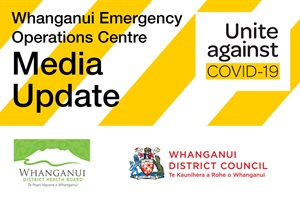Whanganui Emergency Operations Centre (WDHB) media advisory
Published on 07 April 2020

Alex Forsyth, Director of Allied Health Scientific and Technical at the Whanganui District Health Board, says having her three children checked out by the Whanganui Accident and Medical clinic (WAM) over the weekend was a positive experience and much easier than she had anticipated.
She says, “All of my children needed to be checked out, so I asked for a virtual consultation with WAM. I initially spoke to a really lovely nurse for triage, who quickly identified I needed to talk to a doctor and told me I would be contacted back.
“A doctor did call me back, and quickly but thoroughly diagnosed all three of my children with their ‘garden-variety’ ails and ills – and offered to fax their prescriptions to the Springvale pharmacy.
“A quick pick-up from Springvale after a text from them and I had the prescriptions.”
Alex Forsyth says, “There was no waiting, no wasting of anyone’s time. Although there were several hours between my request and the doctors consult, it felt like nothing as I was able to get on with other tasks at work.
“The consultations themselves didn’t feel rushed and were thorough, with clear solutions – a win all around.”
Judith MacDonald, Operations Lead at the Whanganui Emergency Operations Centre, says people may not realise WAM is still available for after-hours consultations. “We are offering after-hours assessment and consultations over the phone and we can arrange prescriptions for you to collect from your nearest pharmacy.”
She says it’s important people follow up on health concerns early, rather than leaving it until a minor issue becomes more serious. “You can still call your GP for an appointment, you can still contact WAM for after-hours medical care and, fortunately in Whanganui, you can still access urgent dental care.”
“General practices across our region are still operating, offering virtual and face-to-face clinical care. If you are not certain please ring your practice provider. WAM is still operating as an Urgent Care Accident and Medical clinic seven days per week for accidents.”
Community-based assessment centres (CBACs) around the district are seeing all people that have symptoms common to COVID-19. This ensures that WAM is remaining a “clean clinical care space”.
Ms MacDonald says, ”An important message for the community is to ring first if you possibly can.”
Key Whanganui Region health information
- As of 6 April 2020 a total of seven people have COVID-19 in the Whanganui Region, all of whom have returned to New Zealand from overseas.
- Five people are in the Ruapehu District and two are in the Whanganui District.
- Public Health staff are in daily contact with those people who have confirmed or probable cases of COVID-19 and contact tracing will be undertaken.
- We ask people to stay home, and to look after themselves and the people they care most for. By staying home they can help slow the spread of the virus and break the chain.
- We can slow the spread if we all work together. Physical separation of two metres is of the utmost importance outside your bubble, but that does not mean social separation so keep in touch by other means.
- Remember to regularly wash your hands and dry them well.
- And always cough and sneeze into your elbow.
- Reminder – the only hospital visiting allowed is one visitor for patients: At end-stage of life, in the Critical Care Unit, in the Maternity Unit and in the Children’s Ward. All visitors must be part of the patient’s bubble.
- Whanganui Hospital is open 24/7 for critical cases and those patients who need urgent care.
- In the Waimarino Region a reduced maternity service commenced on Monday, 30 March, 2020, as there is only one midwife available. This means all women due to give birth in the next four weeks will be advised to do so in Whanganui Hospital.
- Pregnant women can still have a support person from their bubble during labour and birth, and can hold their new-born skin to skin and share a room with their baby. However, they must wash hands and dry them thoroughly before and after touching their baby. Seeing a midwife for routine and urgent visits is still necessary throughout lockdown. The midwife will do as much consultation as they can over the phone or via video conferencing, and the number of face-to-face visits may be reduced. Please talk to your midwife if you have any queries.